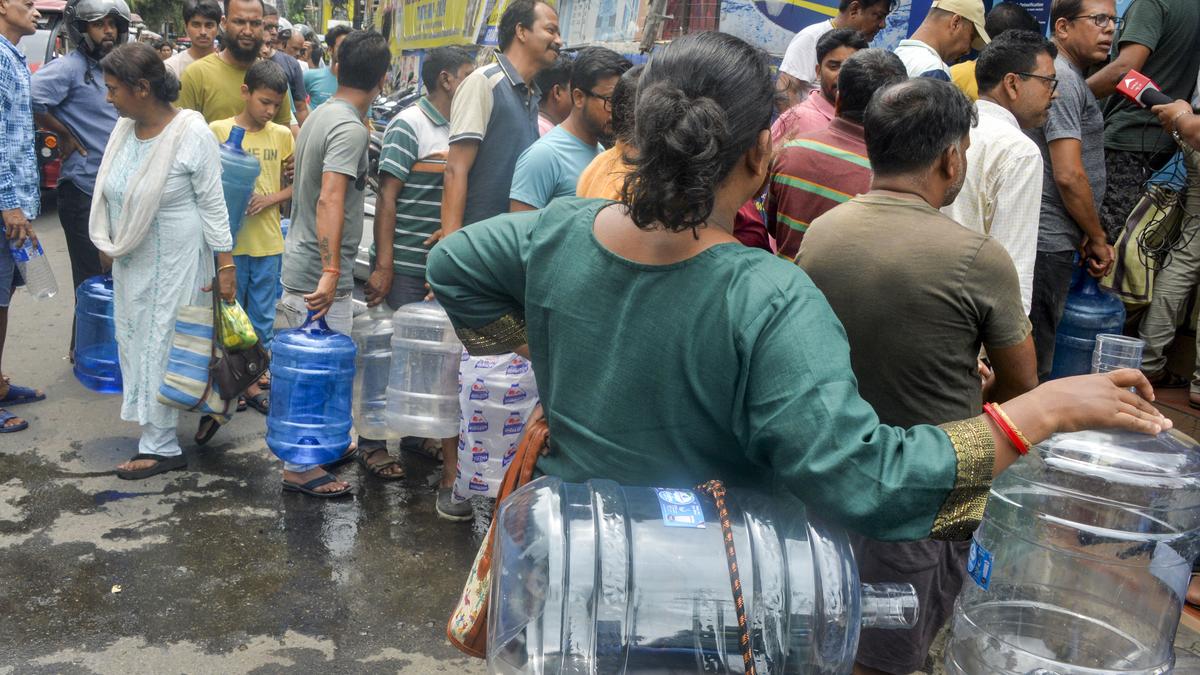
Protests erupt in West Bengal’s Siliguri over contaminated drinking water supply by civic body
The Hindu
Protests erupt in Siliguri over contaminated water crisis, Mayor announces unfit water supply, prompting distribution of water pouches.
Protests have erupted in West Bengal’s Siliguri town in the wake of an unprecedented scarcity of drinking water, with the civic body announcing that the water supplied is unfit for drinking. Gautam Deb, Mayor of the Trinamool-run Siliguri Municipal Corporation (SMC), had on Wednesday announced that as the Irrigation Department was carrying maintenance work at the Teesta canal, the civic body is drawing water from Mahananda river to its treatment plant in Fulbari. This water is high in BOD (biochemical oxygen demand) and harmful for regular consumption, he said.
“Maintenance work by the State irrigation department on the Teesta river bank will continue till June 1. I request everyone to not drink the water that is being supplied by the Municipal Corporation till June 2. It can, however, be used for other purposes. Until then, the municipal corporation will distribute water pouches for drinking purposes through the boroughs,” Mr. Deb said.
Siliguri, located in the Darjeeling district near the State’s northern border at the foothills of the Himalayas, is one of the most-populated cities in West Bengal.
Members of the Bharatiya Janata Party (BJP), the Darjeeling wing of the Communist Party of India (Marxist) and the Socialist Unity Centre of India-Communist (SUCI-C) carried out separate protest marches and sit-in demonstrations on Thursday and Friday, demanding the resignation of the Mayor and accusing the civic body of supplying contaminated water to residents.
“The Honourable Mayor of Siliguri Municipal Corporation made the people of Siliguri drink contaminated water for the last 20 days because of his inefficiency,” local BJP leader Shankar Ghosh posted on X.
CPI(M) leader and former Siliguri Mayor Asok Bhattacharya demanded an explanation as to why the civic body had initially assured residents that water being drawn from the Mahananda river is safe for drinking, adding that this “betrayal” should be dealt with sternly. “Supplying contaminated water to people is a crime that warrants punishment,” he said.
To mitigate the crisis, the civic body has been distributing 1 lakh water pouches in the town every day. As of Friday, the number of water pouches being distributed was increased to 2 lakh a day.

“Writing, in general, is a very solitary process,” says Yauvanika Chopra, Associate Director at The New India Foundation (NIF), which, earlier this year, announced the 12th edition of its NIF Book Fellowships for research and scholarship about Indian history after Independence. While authors, in general, are built for it, it can still get very lonely, says Chopra, pointing out that the fellowship’s community support is as valuable as the monetary benefits it offers. “There is a solid community of NIF fellows, trustees, language experts, jury members, all of whom are incredibly competent,” she says. “They really help make authors feel supported from manuscript to publication, so you never feel like you’re struggling through isolation.”

Several principals of government and private schools in Delhi on Tuesday said the Directorate of Education (DoE) circular from a day earlier, directing schools to conduct classes in ‘hybrid’ mode, had caused confusion regarding day-to-day operations as they did not know how many students would return to school from Wednesday and how would teachers instruct in two modes — online and in person — at once. The DoE circular on Monday had also stated that the option to “exercise online mode of education, wherever available, shall vest with the students and their guardians”. Several schoolteachers also expressed confusion regarding the DoE order. A government schoolteacher said he was unsure of how to cope with the resumption of physical classes, given that the order directing government offices to ensure that 50% of the employees work from home is still in place. On Monday, the Commission for Air Quality Management in the National Capital Region and Adjoining Areas (CAQM) had, on the orders of the Supreme Court, directed schools in Delhi-NCR to shift classes to the hybrid mode, following which the DoE had issued the circular. The court had urged the Centre’s pollution watchdog to consider restarting physical classes due to many students missing out on the mid-day meals and lacking the necessary means to attend classes online. The CAQM had, on November 20, asked schools in Delhi-NCR to shift to the online mode of teaching.









